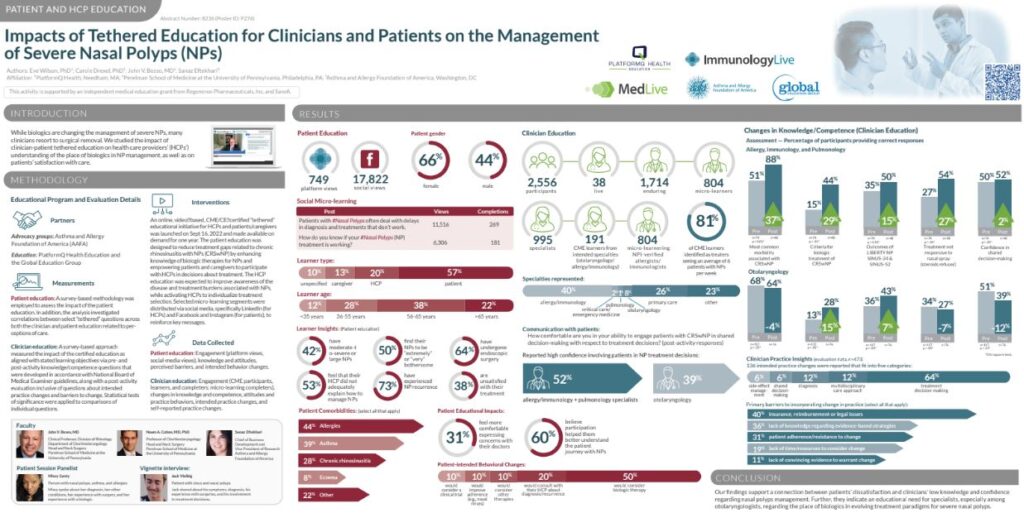PlatformQ Health, the Asthma and Allergy Foundation of America (AAFA), and BlackDoctor.org were seeking to understand whether aligned (sequential patient/provider) education could help improve health equity for those suffering from conditions such as asthma and atopic dermatitis. Black people with asthma are more likely to succumb to asthma than White individuals. Health educators are looking to understand providers’ perceived barriers to the use of biologics for non-White patients. Additionally, providers are often unprepared to care for patients with darker skin who have atopic dermatitis.
To address such issues, the organizations produced three digital education initiatives:
- A one-hour CME asthma program featuring a panel discussion with faculty from the Herbert Wertheim School of Public Health and George Washington University, an AAFA representative, along with video segments of a patient interview
- A one-hour program for providers and patients/caregivers focused on reducing treatment gaps related to chronic rhinosinusitis and helping patients and caregivers learn to participate in shared decision-making
- Several micro-learning (short video segments) were also shared on social media to reinforce key messages
- One live session featuring faculty from George Washington University School of Medicine and Health Sciences, Weill Cornell Medicine, AAFA, as well as
- patients, followed by four 15-minute online modules focused on atopic dermatitis
PlatformQ Health presented three posters sharing the program outcomes at the 2023 American College of Allergy, Asthma, and Immunology annual meeting.
Outcome highlights:
Asthma program
- 2,064 learners participated in the asthma program, and there were 31,927 social media engagements of the patient interviews that were part of the program.
- Learners were those with a high need for care, as noted in the below chart.

Click here to download the full Asthma Poster
For the CME session:
- 58% of the participants were primary care providers.
- 65% of CME learners reported that they treated an average of nine non-White patients with asthma each week.
- The program demonstrated notable increases in competency around topics such as:
- factors contributing to suboptimal adherence to asthma treatment.
- Interventions that can lower rates of severe asthma exacerbation among Black and Latinx populations.
Atopic dermatitis program
- The atopic dermatitis program resulted in 1,846 platform views and 29,067 social media views.
- More than 50% of participants were Black, Asian, mixed race/ethnicity, Native Hawaiian, or other Pacific Islander. Participants had a range of comorbidities, noted below.

Click here to download the full Atopic Dermatitis Poster
While the post activity survey sample size was small, data suggests that education helps empower people of color to seek care for atopic dermatitis and comorbidities. The data also revealed communication gaps between point-of-care and atopic dermatitis care providers.
Nasal polyps program
The nasal polyps program resulted in 749 platform views and 17,822 social views.
Learners shared insights that revealed a need for improvement on many fronts. For example:

Click here to download the full Nasal Polyps Poster
- After participating in the program, 60% of participants said they believe what they learned helped them to better understand the patient journey with nurse practitioners.
- Thirty one percent also said they now feel more comfortable expressing concerns to their doctors.
- 50% said they would consider biologic therapy.
- The CME session resulted in significant improvements in knowledge across topics such as:
- Criteria for biologic treatment
- Addressing treatment not response to nasal sprays
- Common comorbidities associated with the condition
As providers’ knowledge of treating these conditions improves, so will patient satisfaction. These sessions indicate a need for education across specialists to understand evolving treatment options.

